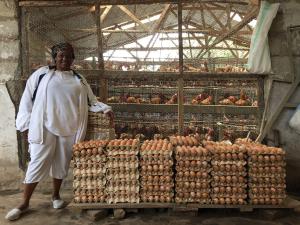The government of Tanzania removed a cost-prohibitive value-added tax on the sale of animal feed earlier this summer in part thanks to the combined efforts of the U.S. Grains Council (USGC) and the Tanzanian poultry and animal feed industry associations.
“The removal of the tax is a huge relief to the industry at a time where the feed industry is struggling with the high cost of production due to a severe regional drought that has driven up the price of raw materials,” said Anne Zaczek, USGC manager of global development programs.
Feed accounts for as much as 70 to 80 percent of poultry production costs in Tanzania. Yet corn prices in Tanzania are currently more than double the average cost of due to restrictive import regulations, inadequate infrastructure and resulting limited corn imports. Adding to this high input cost, the Tanzanian government instituted the 18 percent value-added tax on animal feed sales in July 2016.
The cumulative fiscal strain hit local the feed manufacturing industry, resulting in many millers going out of business temporarily or leaving the market permanently. Subsequently, poultry producers also halted production as the high costs and stagnant market price made profitable business impossible.
Since its inception, the Poultry Association of Tanzania (PAT) and its members, including the Tanzanian Animal Feed Manufacturers Association (TAFMA), have lobbied the government to remove the tax. The groups, supported by the Council, argued the tax was counterproductive to the growth of the domestic poultry and animal feed industries in Tanzania.
The removal of the tax on animal feed as of June will allow for some poultry producers and feed millers to re-enter the market and compete in this growing industry. In addition, the removal of the tax will ultimately benefit Tanzanian consumers by lowering the cost of poultry and eggs.
“The associations’ success in working as a team to have the government remove this extremely restrictive tax shows the enormous impact our program is having on the ground in Tanzania,” Zaczek said. “We look forward to continuing our work with the associations to break down barriers restricting the industries’ growth.”
The Council’s program in Tanzania is funded through the U.S. Department of Agriculture’s Food for Progress (FFP) program, designed to promote the development and professionalization of the country’s commercial poultry and feed sectors. One main objective is to develop strong industry associations in Tanzania to strengthen the local commercial poultry and feed industry through training and mentoring initiatives, similar to the Council’s successful work in other countries like Morocco.
More about the Council’s work in Tanzania is here.


